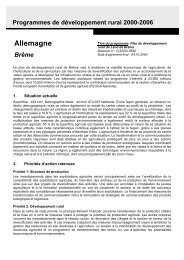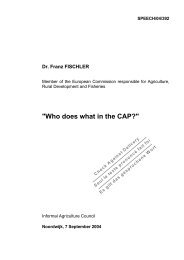B2B Internet Trading Platforms - EDIS
B2B Internet Trading Platforms - EDIS
B2B Internet Trading Platforms - EDIS
Create successful ePaper yourself
Turn your PDF publications into a flip-book with our unique Google optimized e-Paper software.
The next problem is to find the right partners for online businesses, bearing in mind that <strong>B2B</strong> e-<br />
marketplaces offer the opportunity to engage into new business relationships. Many information<br />
services, such as <strong>Internet</strong> portals and information directories have been developed by the market,<br />
providing businesses with various type of information which facilitate online transactions. Such<br />
<strong>Internet</strong> portals include databases, which allow business to search for companies or e-marketplaces,<br />
products and services, often offering advanced search functionality, e.g. a search for the supplier of<br />
specific products. In some cases they only provide a link to the relevant web site and in other they give<br />
more detailed information on the company itself or the e-marketplace. Such information usually<br />
includes e.g. the name of the company, contact details, legal form, trade register and registration<br />
number, executives, financial information, nature of the business activities, business model of the e-<br />
marketplace etc<br />
Other services have been developed by public authorities, such as Trader Registers 7 , which have<br />
officially the duty to collect and update company information. In these cases, a large variety of<br />
information is provided, ranging form standard company data e.g. identification, management, trading<br />
activity, turnover, balance sheets and annual accounts, to more detailed economic and legal<br />
information e.g. level of debt, payment suspension declarations, liquidation procedures, legal actions<br />
and bankruptcies. The main advantage of such services is their reliability, as they are based on official<br />
sources. Their disadvantage is that they are normally not free of charge.<br />
At European level, a telematic network connecting the business registers of 13 European countries has<br />
been implemented – the European Business Register (EBR) – with the specific task to make available<br />
data originating from the process of business registration. Building upon this network, an online<br />
information service will be developed to deliver authenticated, official company information about<br />
companies with an own website, including company name, identification of the register, VAT number<br />
etc. This “Trust and <strong>Internet</strong> Confidence Service” (EBR-TIC) responds to the legal transparency<br />
requirements for online service providers, as defined by the EU E-commerce Directive. The objective<br />
is to provide, by the year 2005, such “TIC profiles” for 1 million companies in Europe.<br />
Finally, the efficiency of <strong>Internet</strong> trading platforms and their further prospects strongly depend on the<br />
availability of commonly used standards. Clearly, standardisation issues are not confined to e-<br />
marketplaces but have to be addressed in a more general context. Rather, e-business standards of<br />
different kind form the foundation for electronic <strong>B2B</strong> transactions of many kinds. The more<br />
information is exchanged between companies and the higher the degree of automation in information<br />
exchange, the more important do standards become.<br />
The first specific issue is that of product identification. E-business can only be conducted reliably if<br />
each product can be identified in a unique manner. The use of different data standards by buyers and<br />
sellers can reduce the extent to which the full benefits of e-marketplaces are realised. However, neither<br />
the standards for data exchange, based on XML, nor for products and services (“e-catalogues”) are<br />
generally accepted within industries and across borders. For example, on the <strong>Internet</strong> more than 160<br />
different and mostly incompatible standards for electronic catalogues are said to be found, making it<br />
for SMEs very difficult to decide which standards should be followed for the documentation and<br />
classification of products and services.<br />
The second issue to be discussed are industry-specific e-business standards. As each industry has its<br />
own processes and problems, there is a tendency to create industry-specific standards to accommodate<br />
these peculiarities. At first sight, it might seem to be sub-optimal if each industry invents its own set of<br />
standards upon which <strong>B2B</strong> <strong>Internet</strong> trading platforms are based. One might be inclined to call for a set<br />
of standards that is unique across industries and covers all products. For example, it would be essential<br />
that industry and retail sectors work together and not to develop inconsistent solutions. The same<br />
applies to the need to find, preferably at international level, a common base for a future ebXML<br />
standard. On the other hand, it has to be acknowledged that the cost of implementation of a consistent<br />
7<br />
Greffiers du tribunal de commerce de Paris, http://www.infogreffe.fr<br />
19





